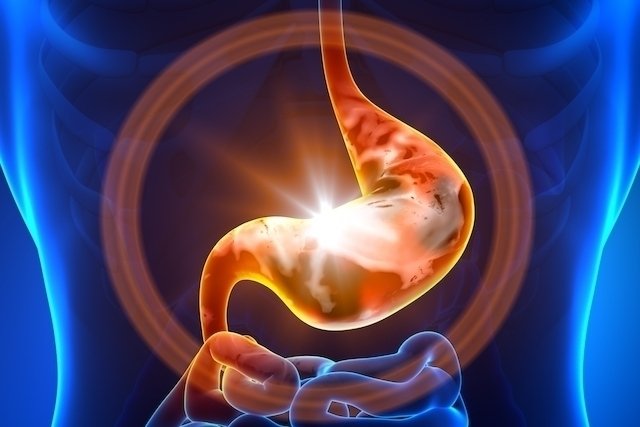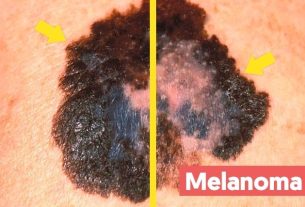Intestinal metaplasia is a change in the cells in the lining of the stomach or esophagus that become similar to cells found in the intestine. It is considered a precancerous change, meaning it has the potential to become stomach cancer.
Intestinal metaplasia does not cause symptoms, but is often associated with bacterial infection H. pylorito cases of gastritis or ulcers and, therefore, the person may feel pain or burning in the stomach, nausea and have dark stools.
The treatment for intestinal metaplasia is not yet well defined, but the gastroenterologist may recommend the use of medications to reduce stomach acidity and antibiotics to eliminate the intestinal metaplasia infection. H. pylorisuch as amoxicillin, as this way it is possible to reduce the cellular changes caused by this condition.

Main symptoms
Intestinal metaplasia does not cause symptoms, however, most of the time it is associated with infection with the bacteria H. pylori, which causes the appearance of gastritis and ulcers in the stomach and intestine, and in these cases, the signs that may appear are:
- Pain and burning in the stomach;
- Nausea and vomiting;
- Indigestion;
- Feeling of a swollen belly;
- Constant burping and intestinal gas;
- Dark, bloody stools.
Generally, the diagnosis of intestinal metaplasia is made by chance when the doctor is screening for other problems of the digestive system, including cancer, through tests such as digestive endoscopy and gastric biopsy.
The biopsy can be performed at the time of endoscopy, where the doctor takes a small sample from the stomach, which generally has the appearance of whitish plaques or spots, and sends it to the laboratory for immunohistochemistry, where it will be analyzed. cell types. See more about how endoscopy is performed and how to prepare.
Possible causes
The causes of intestinal metaplasia are not yet fully known, however, it is caused due to chronic irritation of the cells lining the stomach or esophagus.
Some factors may contribute to the emergence of intestinal metaplasia, such as:
- Bacterial infection H. pylori;
- Chronic gastroesophageal reflux;
- Cigarette use;
- Family history of stomach cancer, especially first-degree relatives;
- Diet poor in vitamin C.
In some cases, intestinal metaplasia can also be caused by stomach acidity, as occurs in gastritis, nitrate formation in the stomach and hypochlorhydria, as these situations damage the cells of the stomach wall. See what hypochlorhydria is and how to treat it.
Is intestinal metaplasia cancer?
Intestinal metaplasia is not considered a type of cancer, however, it is known for its precancerous lesions, that is, if it is not reversed it can become cancer. A person diagnosed with this condition should undergo long-term follow-up with a gastroenterologist to eliminate the bacteria. H. pylori and routinely perform exams to check whether intestinal metaplasia lesions are regressing.
Therefore, it is important not to abandon the treatment even if it is long and the recommended diet must be maintained as this is how it will be possible to reduce cellular damage caused by intestinal metaplasia and reduce the risk of this condition becoming stomach cancer.
As gastritis is a risk factor for the development of intestinal metaplasia, see more about the diet that should be followed to improve gastritis:
How the treatment is carried out
There is still no specific treatment for intestinal metaplasia, but therapy to reverse this condition is recommended by a gastroenterologist and consists mainly of reducing the symptoms of stomach inflammation, with the use of medications to reduce acidity, such as omeprazole, and in the elimination of infection by the bacteria H. pylori through the use of antibiotics, such as clarithromycin and amoxicillin.
The doctor may also recommend medications based on ascorbic acid, better known as vitamin C, and dietary supplements with antioxidant nutrients, as this can help reduce inflammation and reduce damage caused by intestinal metaplasia.
Furthermore, it is very important to eat a balanced diet rich in antioxidant foods, found in foods with beta-carotene such as tomatoes, and which help to minimize the symptoms of gastritis and ulcers, such as vegetables and yogurt. Find out more about how to follow a diet for gastritis and ulcers.
Bibliography
- MATOS, Leopoldo; FIGUEIREDO, Pedro N. Fundamental gastroenterology. 1st ed. Lousã: Lidel, 2013. 117-126.
- WALKER, M.M. Is intestinal metaplasia of the stomach reversible?. Good. Vol.52, n.1. 1-4, 2003
- REDDY, Kavya M. et al. Risk of Gastric Cancer Among Patients With Intestinal Metaplasia of the Stomach in a US Integrated Health Care System. Clinical Gastroenterology and Hepatology. Vol.14. 1420-1425, 2016
- PARK, Yo H.; KIM, Nayoung. Review of Atrophic Gastritis and Intestinal Metaplasia as a Premalignant Lesion of Gastric Cancer. Journal of Cancer Prevention. Vol.20. 25-40, 2015

Sign up for our newsletter and stay up to date with exclusive news
that can transform your routine!
Warning: Undefined array key "title" in /home/storelat/public_html/wp-content/plugins/link-whisper-premium/templates/frontend/related-posts.php on line 12
Warning: Undefined array key "title_tag" in /home/storelat/public_html/wp-content/plugins/link-whisper-premium/templates/frontend/related-posts.php on line 13




